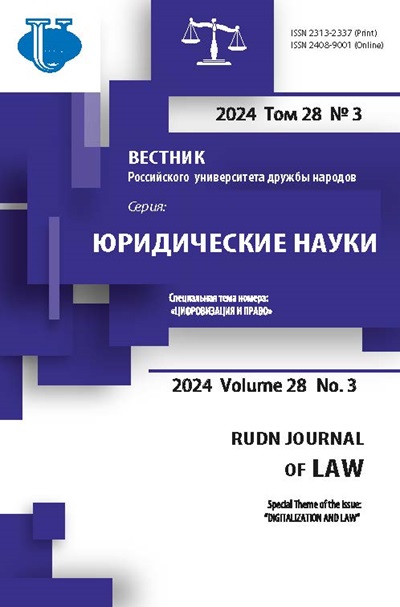The doctrine of frustration and the doctrine of force majeure in Indian law enforcement practice in the digital era
- Authors: Begichev A.V.1, Tsander Y.M.1
-
Affiliations:
- RUDN University
- Issue: Vol 28, No 3 (2024): DIGITALIZATION AND LAW
- Pages: 604-621
- Section: CIVIL LAW
- URL: https://journals.rudn.ru/law/article/view/40938
- DOI: https://doi.org/10.22363/2313-2337-2024-28-3-604-621
- EDN: https://elibrary.ru/JAPSAB
Cite item
Full Text
Abstract
The article delves into the comparative legal analysis of the doctrines of force majeure and frustration in Indian legislation, which are the most relevant in contemporary scenarios. The objective is to examine the legal essence of these concepts, identify similarities and differences, and outline the characteristics of circumstances leading to contract impossibility and constituting force majeure events. Through a review of Indian legislation and judicial precedents, the article seeks to explore the application scope of these doctrines, including in the context of digitalization and the rise of electronic document management. The employed methods include theoretical approaches such as formal and dialectical logic, comparative-legal logic, interpretation, and description. Specific scientific methods comprise juridical-dogmatic analysis and the interpretation of legal norms. The results highlight that in Indian law, the doctrine of force majeure is invoked in the presence of a specified «force majeure event» outlined in the contract, while «impossibility» encompasses other unforeseen circumstances not covered by the force majeure clause. Notably, in Indian practice, «impossibility» is construed as «impracticability» not solely as literal physical «impossibility». In conclusion, a key distinction between frustration and force majeure lies in the event’s impact on the contract. Nevertheless, despite these distinctions, both legal institutions share a common objective of mitigating potential losses for contractual parties when unforeseen circumstances impede the fulfillment of obligation.
About the authors
Alexander V. Begichev
RUDN University
Author for correspondence.
Email: begichev100@mail.ru
ORCID iD: 0009-0003-4329-9938
Doctor of Legal Sciences, Full Professor of Department of Civil Law and Civil Procedure and Private International Law, Law Institute
6 Miklukho-Maklaya str., Moscow, 117198, Russian FederationYana M. Tsander
RUDN University
Email: janastr@mail.ru
ORCID iD: 0000-0001-8898-1234
graduate student of Department of Civil Law and Civil Procedure and Private International Law, Law Institute
6 Miklukho-Maklaya str., Moscow, 117198, Russian FederationReferences
- Arhipov, D.A. (2020) Modification of Obligations in the Event of Force Majeure: Theory and Practice. Sudya. 7(115), 59-64. (in Russian).
- Beatson, J., Burrows, A. & Cartwright, J. (2010) Anson’s Law of Contract. Oxford, Oxford University Press.
- Begichev, A.V. (2022a) The role of digitalization in the interaction of judicial and notarial authorities in conciliation procedures. RUDN Journal of Law. 26(2), 485-500. https://doi.org/10.22363/2313-2337-2022-26-2-485-500 (in Russian).
- Begichev, A.V. (2022b) Remote Digital Technologies for Notary Protection of the Rights of Economic Activities Participants. In: Inshakova, A.O. & Frolova, E.E. (eds.). Smart Technologies for the Digitisation of Industry: Entrepreneurial Environment. Smart Innovation, Systems and Technologies, vol 254. Springer, Singapore. pp. 165-178. https://doi.org/10.1007/978-981-16-4621-8_14
- Belov, V.A. (2014) Indian Law on Treaties of 1872 (General Information, General Commentary, Original Text and Russian Translation). Journal of Jurisprudence. 6(317), 143-205. (in Russian).
- Bezbakh, V.V. & Frolova, E.E. (2022) Augmented Reality and Civil Law Regulation of Business Relations. Smart Innovation, Systems and Technologies. (254), 29-37. https://doi.org/10.1007/978-981-16-4621-8_3
- Ennekcerus, L. & Kipp, T., Wolf, M. (1950) Course of German Civil Law. Genkin, D.M. & Novitsky I.B. (eds.). Transl. from the 13th German by K.A. Grave et al. Foreign Literature Publishing House. (in Russian).
- Fonotova, O.N. & Indinok, P.D. (2022) Execution of International Commercial Contracts in the Context of the COVID-19 Pandemic: Foreign and Russian Legal Regulation. Zakonodatel’stvo. (5), 63-70. (in Russian).
- Gimadrislamova, O.R. & Timofeeva, K.S. (2021) Correlation of Russian Institutions of Force Majeure and Termination of Obligation with the English Doctrine of Frustration. Eurasian Law Journal. 1(152), 187-190. https://doi.org/10.46320/2073-4506-2021-1-152-187-190 (in Russian).
- Kanashevsky, V.A. (2008) Foreign Economic Transactions: Substantive and Conflict Regulation. Moscow, Wolters Kluver Publ. (in Russian).
- Korshunova, N. P. (2008) Insuperable Force: A New Sight at the Old Problem. Journal of Russian Law. 3(135), 78-93. (in Russian).
- Krasheninnikova, N.A. (1982) Hindu Law: History and Modernity. Preface by O. Zhidkov. Moscow, MSU Publishing House. (in Russian).
- Lukashuk, I.I. (2007) Issues of Responsibility in the Law of Treaties. International Public and Private Law. (1), 2-4. (in Russian).
- Novitskii, I.B. & Pereterskii, I.S. (eds.). (2014) Roman Private Law: Textbook. Moscow, KNORUS Publ. (in Russian).
- Pirviz, E.E. (2010) The Meaning of Guilt, Chance and Force Majeure in Civil Law. Part Two. Civil law review. (6), 146-206. (in Russian).
- Protopopova, O.V. & Botvinnik, S.L. (2020) Doctrine of frustration of contract in English law. Economic Problems and Legal Practice. (6), 159-164. (in Russian).
- Rao, T.S.R. (1958) Conflict of laws in India. Zeitschrift Für Ausländisches Und Internationales Privatrecht. 23(2), 259-279. Available at: http://www.jstor.org/stable/27873899
- Rusakova, E.P. & Frolova, E.E. (2022) Current Problems of Digital Justice in the BRICS Countries. Smart Innovation, Systems and Technologies. (254), 143-153. https://doi.org/10.1007/978-981-16-4621-8_12
- Terdi, E.S. (2018) English Model of Impossibility of Performance of Obligation: History of Formation and Peculiarities of Reception (on example of India). Russian Justice. 6(146), 22-46. (in Russian).
- Tololaeva, N.V. & Tserkovnikov, M.A. (2023a) Scientific and Practical Commentary on the Resolution of the Plenum of the Supreme Court of the Russian Federation No. 7 of March 24, 2016 On Court Application of Certain Provisions of the Civil Code of the Russian Federation Regarding Liability for Breach of Obligations (Beginning). Civil Law Review. (5), 153-199. https://doi.org/10.24031/1992-2043-2023-23-5-153-199 (in Russian).
- Tololaeva, N.V. & Tserkovnikov, M.A. (2023b) Scientific and Practical Commentary on the Resolution of the Plenum of the Supreme Court of the Russian Federation No. 7 of March 24, 2016 On Court Application of Certain Provisions of the Civil Code of the Russian Federation Regarding Liability for Breach of Obligations (Finale). Civil Law Review. (6), 133-197. https://doi.org/10.24031/1992-2043-2023-23-6-133-197 (in Russian).
















